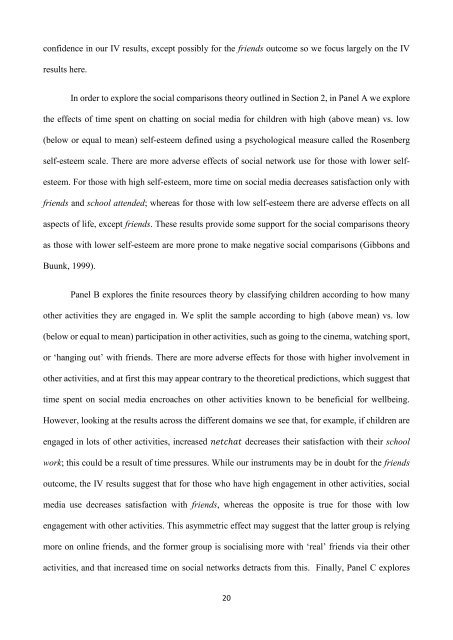Discussion Paper Series Social Media Use and Children’s Wellbeing
dp10412
dp10412
You also want an ePaper? Increase the reach of your titles
YUMPU automatically turns print PDFs into web optimized ePapers that Google loves.
confidence in our IV results, except possibly for the friends outcome so we focus largely on the IV<br />
results here.<br />
In order to explore the social comparisons theory outlined in Section 2, in Panel A we explore<br />
the effects of time spent on chatting on social media for children with high (above mean) vs. low<br />
(below or equal to mean) self-esteem defined using a psychological measure called the Rosenberg<br />
self-esteem scale. There are more adverse effects of social network use for those with lower selfesteem.<br />
For those with high self-esteem, more time on social media decreases satisfaction only with<br />
friends <strong>and</strong> school attended; whereas for those with low self-esteem there are adverse effects on all<br />
aspects of life, except friends. These results provide some support for the social comparisons theory<br />
as those with lower self-esteem are more prone to make negative social comparisons (Gibbons <strong>and</strong><br />
Buunk, 1999).<br />
Panel B explores the finite resources theory by classifying children according to how many<br />
other activities they are engaged in. We split the sample according to high (above mean) vs. low<br />
(below or equal to mean) participation in other activities, such as going to the cinema, watching sport,<br />
or ‘hanging out’ with friends. There are more adverse effects for those with higher involvement in<br />
other activities, <strong>and</strong> at first this may appear contrary to the theoretical predictions, which suggest that<br />
time spent on social media encroaches on other activities known to be beneficial for wellbeing.<br />
However, looking at the results across the different domains we see that, for example, if children are<br />
engaged in lots of other activities, increased netchat decreases their satisfaction with their school<br />
work; this could be a result of time pressures. While our instruments may be in doubt for the friends<br />
outcome, the IV results suggest that for those who have high engagement in other activities, social<br />
media use decreases satisfaction with friends, whereas the opposite is true for those with low<br />
engagement with other activities. This asymmetric effect may suggest that the latter group is relying<br />
more on online friends, <strong>and</strong> the former group is socialising more with ‘real’ friends via their other<br />
activities, <strong>and</strong> that increased time on social networks detracts from this. Finally, Panel C explores<br />
20


